How do you fight extreme wildfires?
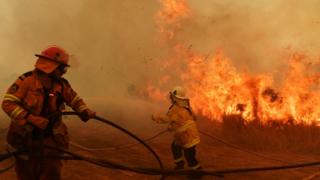
Image copyright
Getty Images

The sight of soaring flames, burning trees and scorched earth is becoming a familiar one for people around the world.
From Brazil to Australia, and from California to Indonesia, massive wildfires have torn through vast areas of forest this year. So how do you fight them?
Alexander Held, an expert in wildfires at the European Forest Institute, and Kirsten Langmaid, a firefighter from Australia, talk us through the process.
Step one: Preparation
Alexander: Landowners and the authorities can absolutely take action to better prepare for wildfires.
A top priority should be managing the amount of vegetation a fire can consume. This can be done with machinery or by grazing animals such as sheep or goats. Plus, if a wildfire runs into a pasture area then it will eventually die by itself because there won’t be enough fuel.
The controlled use of fire is another option. This involves burning some down some vegetation under carefully managed conditions.

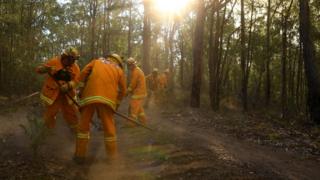
Image copyright
EPA

In high-risk areas, there should also be control lines that divide up the land and make it harder for wildfires to spread. These can be things like roads, rivers, railway lines or constructed fire breaks. Fire breaks are areas that are free of vegetation.
It’s also important for homeowners to make sure their house can be easily reached by firefighters. They need to keep on top of any potential burning material around their home, like gas tanks and fire wood.

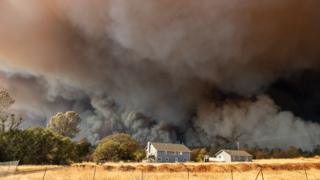
Image copyright
Getty Images

Step two: Spotting the smoke
Alexander: Most fire-prone countries have some form of early-warning system in place. These assess the temperature, fuel level, humidity and wind speed. These give a pretty good idea of what the coming days and weeks might look like.
If there’s an increased risk of wildfires then extra firefighters are put in place, trucks are prepared and the pilots of firefighting aircraft are put on standby.
If a fire ignites then the first step in fighting it is smoke detection. That can either come from a member of the public who reports it or, in remote areas, cameras and lookout towers that spot it.
In some countries, firefighting aircraft are sent out at the first sign of smoke. But this is different in Europe where they don’t tend to be mobilised until three or four days later.

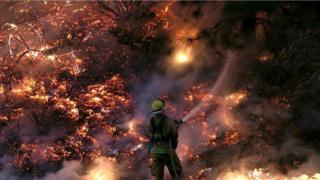
Image copyright
Getty Images

Step three: First attack
Alexander: This is the first phase of suppressing a wildfire.
Kirsten: We always send a rapid response team out during this first attack. These are crews who are fully kitted out with firefighting gear and water-carrying vehicles.
If the location is a little more remote, then we’ll send a plane or a small helicopter up straight away. This is usually just to check it out and they’ll give us a rough estimate of how big the fire is.
We use both dry and wet firefighting techniques. The dry method involves creating boundaries around the fire and letting it burn itself out. Either way, we try to contain it as soon as possible. Hopefully during this initial attack.
Alexander: But if you can’t suppress the fire in the first hour then you move onto the next phase: the extended attack.

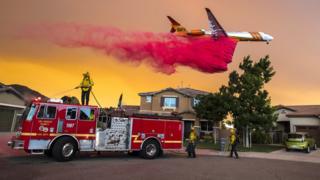
Image copyright
Getty Images

Step four: Extended attack
Alexander: If it gets to this point then you need a lot more resources. The more time you give a wildfire to burn, the bigger they get and the more difficult they become to control.
Kirsten: As soon as the fire passes the first response phase we set up an incident control team. This means we have people back in the office co-ordinating the operation and thinking about the wider strategy.
If the fire is close to a town then we’ll throw everything at it. Initially it’s just vehicles and firefighters but then we’ll move up to fire trucks and then much larger tankers. We use a lot of machinery, like bulldozers, to clear vegetation and create boundaries.
The tactic we use at this point depends on the type of terrain. How we fight a grass fire differs dramatically to how we would fight a pine fire or a tall forest fire. But, generally speaking, it’s a two-phased operation made-up of direct and indirect attacks.
We directly attack the flanks of the fire to narrow the front of it. This is often done with water, fire beaters or by digging earth boundaries parallel to the flames. We try to work from the areas that have already been burnt because these are unlikely to catch fire again.

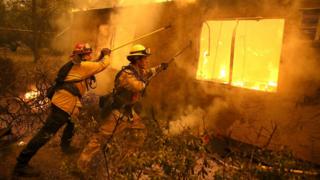
Image copyright
Getty Images

Alexander: But if the fire is too intense and it’s not safe to send people and fire trucks in, you move to indirect attacks. This means positioning crews away from the fire and attacking it with aircraft. You can also fight fire with fire by burning down vegetation ahead of the flames.
Kirsten: When we move to indirect attacks we mainly use aircraft to drop fire retardant and water. But as soon as the smoke gets too bad and visibility becomes too poor, we have to bring them back down again. Another form of indirect attack is to dig control lines ahead of where the fire is going.
We work with the police and the army to try and evacuate people and close roads. If it’s too late for them to leave, then we’ll put out the call to stay and defend. This is when it’s actually safer for people to prepare their houses and stay inside.
In a worst-case scenario we would have hundreds of people on the ground, multiple different agencies involved and multiple aircraft in the skies.

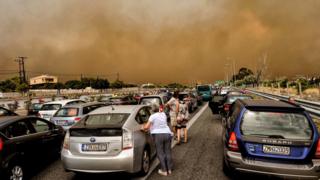
Image copyright
Getty Images

Step five: Mopping up
Kirsten: A fire is under control when there’s a working boundary around it or we’ve cut off its head. In other words – when it can’t spread any further.
But even when it’s under control there’s a long process of mopping up and putting out any lasting fires.
Once we’ve tracked around the whole outside of the fire and it can no longer escape, we come in from the sides and put out any trees that are on fire. This is generally done with ground crews and machinery.
We make sure everything around the perimeter edge is cold. In dry conditions, several days or weeks after a fire, if something is still smouldering and the wind picks up again then a spark could ignite a second blaze. So we take this mopping-up process very seriously.

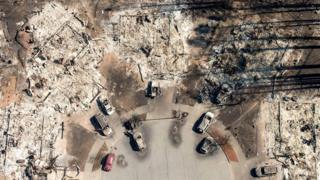
Image copyright
Getty Images

Step six: Aftermath
Kirsten: Even weeks after a fire has gone cold, we will patrol the area and make sure it’s safe. We’ll assess whether to open it back up to the public and remove any trees that could fall down and hurt people.
Community rehabilitation is the longest part of the process afterwards. After a major wildfire, the community could still be feeling its impact years later. Post-traumatic stress disorder is an issue and the government here in Australia provides counselling so people can rebuild their lives and businesses.
As firefighters, we try not to get too emotional. You see farms and houses go up in flames that you’ve been fighting for 10 hours to save. But then you look at an adjacent paddock or a house that you did manage to prevent from burning and it makes it all worthwhile.

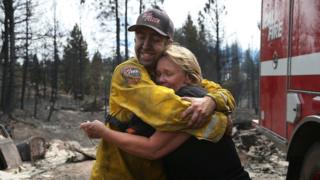
Image copyright
Getty Images

All images subject to copyright.
You might also be interested in:
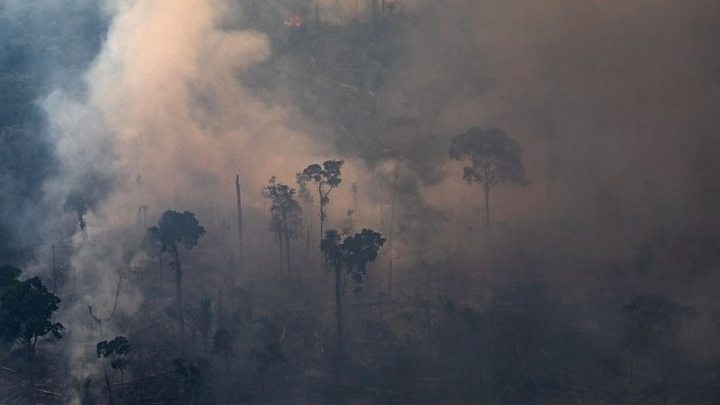
Media playback is unsupported on your device



0 comments